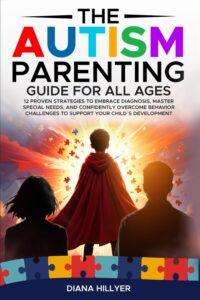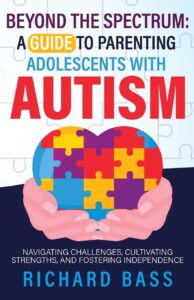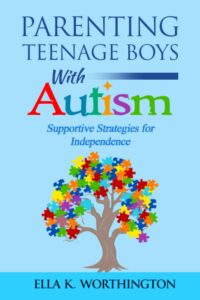Most parents become a bit uneasy when their child is about to become a teenager. Adolescence can bring even more complexity when you have an autistic child due to their social, communication and other challenges. Yet, your teenager also will grow more into their personality, take on more responsibilities and learn essential life skills. So how as a parent can you support your autistic teenager through their adolescent years?
Teenage behaviors and autism

As parents, we all remember our adolescent years and the challenges that we faced. Yet, our autistic teens face greater challenges as so many of the social rules change. When my son J hit his adolescent years, I realized in some ways he was back to square one after all the social skills training and cognitive therapy that he did throughout elementary school.
Social situations intensify in the teenage years, and that can be really hard for our teens on the spectrum. Being interested in another person romantically can be especially difficult for an autistic teenager, both from not knowing how to handle it socially but also from the sexual feelings they begin to have. It can be confusing and overwhelming for some teens.
In addition, your autistic teenager needs to be responsible for their own bodies during the adolescent years. That can be a big step for some, and they don’t always put much focus on it. For boys, they begin growing facial hair and have to be mindful of showering more often and using deodorant to manage body odor. For girls, they are dealing with periods and also personal hygiene. It can be a lot for them to manage at first when they are just learning. It was a big learning curve for my son J early in his teen years, and sometimes he still needs reminders to do certain things.
High school demands and drama

I think teenagers today have it so much harder than many of us as parents had it when we were younger. Our culture and environment along with social media and the constant noise of information complicate our teens’ worlds. I was just talking about this with one of my college roommates yesterday and how it affects our kids now compared to what life was like a couple of decades ago. That is true to all teens, but it’s especially true for autistic teens.
High school demands are tough for our autistic teens. The work for classes becomes more difficult and requires a deeper knowledge than what they did before. They also have to manage it more themselves instead of teachers helping them through it during class like their younger years. Therefore, autistic teens may need new or more support through Individualized Education Plans (IEP) and their resource teachers in high school.
If your autistic/ADHD teen lacks essential executive function skills, then they can become more prominent during their high school years. These are the important skills needed for planning, organization, working memory, emotional control and attention. Having ADHD can affect these skills even more. I’ve written quite a lot about executive function, so you can read more about it in the blog posts about what executive function skills are, how to help your autistic/ADHD child or teen improve them, and how lack of executive function skills are holding back your teen.
Goodness, and then there is all the social drama of high school. Social media and messaging apps through Snapchat, Discord and others intensify social situations and even enable more cyberbullying of our teens. J experienced this while he was in high school. I’m not sure how many people he ended up having to block on various apps, but I recall it was quite a lot.
Then there is the in-person drama during high school. The rumors and gossip can be really overwhelming for autistic teens, and I remember how it really affected J during those years. We spent many hours talking to him through situations and his feelings. If they are the target of anything, it takes a big hit to their self-esteem and can increase depression and anxiety.
Autism and aggression during teen years
Some autistic teens, especially boys, can become more aggressive during their adolescent years. They are physically bigger during those years, so parents can find it much harder to help them calm down and keep them from hurting themselves or others.
You can read my blog post about what to do if your autistic child or teen is aggressive. If you are dealing with this, it may be best to seek professional help through your teen’s doctor or therapist to find ways to reduce their aggressive behaviors.
Ways to help your autistic teenager during adolescent years

Teenage years can bring challenges and angst to our autistic teens, but they also give our teens opportunities to become more independent and take on greater responsibilities in a good way. Here are some ways that I helped my son J through his teenage years, and I hope they give you ideas of how you can help your teen too.
1. Advocate for your autistic teen and teach them self-advocacy
For years, you’ve been your autistic child’s voice for advocacy at school, medical offices and other places. While you still need to continue to do that, it’s time to bring your teen along with you and be sure they learn self-advocacy skills they will need throughout the rest of their lives. Need help? Read my “Advocating for Your Autistic Child” e-book.
2. Be involved in their life (as much as they will let you)
During your autistic teenager adolescent years, they may or may not involve you as much as they did during their childhood. Be okay with that but also be available to be as involved as they let you be.
3. Teach your autistic teen essential life skills
Life skills are so very important. Want to know which ones are best to focus on to be sure your autistic teen is preparing for adulthood? Check out my blog post on this topic. I have found a lot of practical ways to do this with my son J, and I’m sure you will too.
4. Help them improve executive skills functioning
As I noted above, high school can really bring out the lack of executive function skills your teen is experiencing. Here are some ways you can help your autistic teenager improve these essential skills needed for life during their adolescent years.
5. Ensure they receive the care and services they need now
As your autistic teen moves into their adolescent years, the type of care and services they need may change. Make sure you are evaluating what is still needed and where gaps may be. Check out this overview of care/services are available for autism. Having trouble paying for it all? Read this blog post for ways to fund these care and services (and where you can find help to cover the costs).
6. Be a safe place for your teen to talk about challenges they are facing
Let your teen know they can talk about anything with you, and that you are there to help them through their challenges. Knowing you are a safe place for support and love can make a big difference to your autistic teen.
7. Enable social activities with family, friends and the community
School isn’t always the friendliest social place for our autistic teens. Help them have more positive interactions with those who care about them and look for autistic-friendly events to attend in your community.
8. Encourage them to get a part-time job
One of the best ways to improve the chances your autistic teen will be employable after high school is for them to get a part-time job during high school. It doesn’t have to be a lot of hours. My son J worked as a backroom associate for a large retailer in our area for four to eight hours on the weekends during his junior and senior years of high school. You may even want to consider a job coach through Vocational Rehabilitation if your teen is eligible to help them find a job. Also, remember to discuss disclosure of their autism with them so they can make the best decision about when and who to disclose their diagnosis to on the job.
9. Be a parent warrior when needed to ensure your teen’s rights
If you feel like your autistic teen’s rights are being violated, stand up for your teen and ensure they are getting what is their right – whether it’s in education, health care or personal rights.
10. Start letting go of the reins so that your teen can take them more often
Oh, this one is so hard for parents – especially for those of us with autistic kids. Yet, you need to start letting them do things more independently. (And I am telling myself as much as I am advising you!) We have always been in charge and responsible for our autistic child and focused on getting them what they need. Now it’s time to let them start doing that for themselves. Letting go can be one of the hardest things we do as parents!
So, what additional advice do you have for fellow parents of autistic teens? Share in the comments so that we can encourage one another along this journey!
Additional resources
Want even more guidance or information on this topic? Check out these resources available.
Autism and Your Teen: Tips and Strategies for the Journey to Adulthood (affiliate link)

The Breakaway: A Parent’s Guide to Transitioning the Autistic and Twice Exceptional Adolescent Into Young Adulthood (affiliate link)


Beyond the Spectrum: A Guide to Parenting Adolescents With Autism: Navigating Challenges, Cultivating Strengths, and Fostering Independence (affiliate link)

Parenting Teenage Boys with Autism: Supportive Strategies for Independence (affiliate link)








